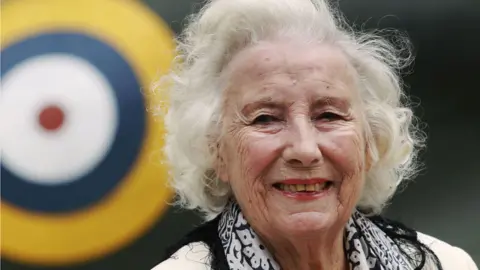Dame Vera Lynn threatened to pull out of D-Day 50th anniversary events
 Reuters
ReutersDame Vera Lynn threatened to pull out of events for the D-Day anniversary in 1994 when sandcastle building and Spam fritter cooking contests were planned.
Newly-released National Archives files show the contests were scrapped after veterans, and Forces' Sweetheart Dame Vera, said they would be inappropriate.
The event to mark the 50th anniversary of the 1944 Normandy Landings still ran into trouble, the documents reveal.
Criticisms included "uninspiring" hymns and problems caused by the weather.
Veterans groups had complained beforehand that the government had got the tone wrong by planning "trivial entertainment" rather than sombre reflection.
Spam fritters - made by battering and deep frying the pink luncheon meat that was sold in cans - became a food staple for many people during the rationing of the world war..
But as Spam had become a butt of many jokes in the subsequent decades - from Monty Python among others - the idea of reviving it for the event in 1994 proved divisive.
In the end, the government's National Heritage secretary met veterans to work out a solution.
'Spam fritter rebound'
In a document called D-Day Post Mortem, principal private secretary Alex Allan wrote to then Prime Minister John Major that there were "inevitably some points to learn from", even though the events "went splendidly" in the end.
The decision to make foreign heads of state and their spouses walk up stairs to a grand dinner at Portsmouth Guildhall was described as "undignified".
Mr Allan said of the entrance to the Guildhall: "I understand the desire to keep the television pictures, but it was pretty undignified for the wives to have to walk up the steps clutching their skirts and their hair in the very strong winds."
It was also noted that the hymns chosen for the Drumhead service were not "ones that people could sing with gusto".
And there were issues with the order of arrivals, with South Africa "a bit fed up" at not being invited to events and the Canadians finding it "pretty frustrating" to be next to last in protocol order.
When John Major's aides were planning the following year's VE and VJ Day commemorations, the D-Day events were fresh in their minds.
In a document about those events, the then-prime minister's press secretary, Christopher Meyer, wrote: "We would have to be utterly sure there was no danger of a Spam fritter-type rebound (eg Vera Lynn causing trouble)."
